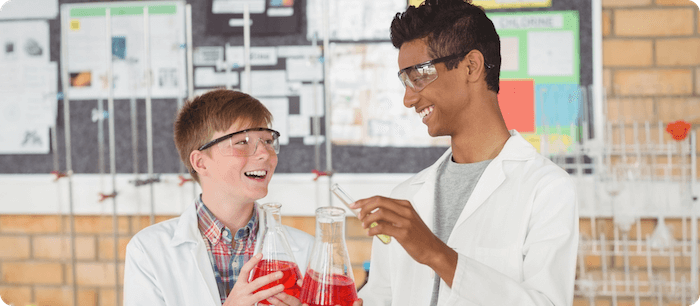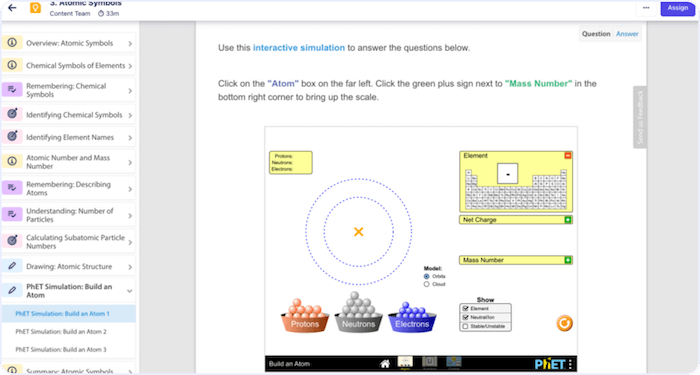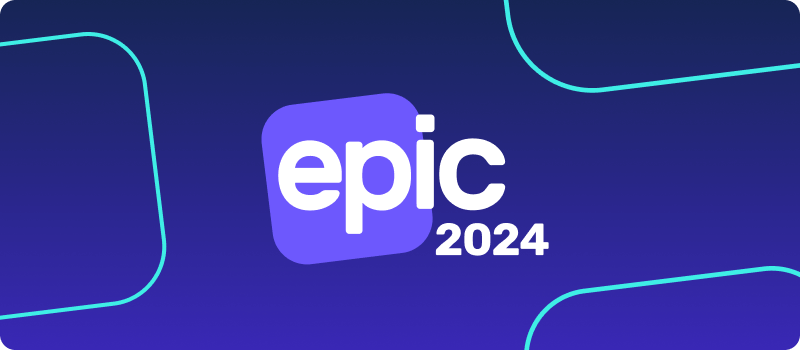Reimagining personalised learning in Science

In Science classrooms worldwide, educators are at a crossroads where technology, learning methodologies, and culture intersect. Classrooms of the past stand in stark contrast to today’s dynamic environments. One-size-fits-all teaching methods are no longer the norm or the expectation. Thanks to recent education technology (EdTech) developments, teachers now have new classroom strategies at their disposal to tailor science education to the diverse needs and capabilities of every student.
From chalkboards to digital learning platforms
Transitioning from conventional teaching practices to digital learning platforms marks a significant evolution in Science education. When we reflect on traditional classrooms of the past, the picture is clear: rows of desks, a teacher standing at the head of the class, and a chalkboard covered in standardised content. This method of teaching, while structured, often overlooked the individual learning style and pace of each student.
Fast-forward to today: advancements in neuroscience and educational psychology have refuted the effectiveness of the one-size-fits-all approach. Instead, we now understand that personalised learning significantly enhances student engagement, lesson retention, and long-term outcomes.
With this knowledge, educators can transform classrooms into hubs for tailored learning. Equipped with EdTech which integrates learning, assessments and analytics tools, teachers can adapt to unique student needs in real-time.
Leveraging EdTech for effective differentiation
Teachers can now harness rich data from EdTech and implement effective differentiation strategies in the classroom. For instance, in a Science classroom, understanding each student’s grasp of complex concepts like photosynthesis or the periodic table can dictate the pace and depth of instruction at an individual level.
Formative assessment provides teachers with the insights they require to suitably differentiate their classrooms to accommodate varying levels of proficiency and learning styles. By facilitating formative assessments, EdTech provides students with real-time feedback. This also allows teachers to quickly and easily identify knowledge gaps, adjust lessons, and empower students learning autonomy.
Enhancing experiences through EdTech
EdTech is not designed to substitute for teaching. Its role is to enhance—not replace—teachers’ classroom practices. Educators are often driven by a passion for developing relationships and the desire to impart knowledge. In this context, EdTech acts as a support system. Digital tools—when adopted correctly—can reduce teachers’ time spent on tedious administrative tasks. Instead, EdTech allows teachers to focus on engaging with their students at a human level, fostering unique relationships.
Collaborative learning environments
Collaboration is a cornerstone of effective learning. EdTech facilitates collaborative experiences with processes like peer reviews and group projects. These processes leverage diverse student strengths and help foster a community of learning.
This is particularly impactful in Science classes, where students can benefit from hands-on group experiments, encouraging interaction and practical application of theoretical knowledge. These approaches to teaching and learning mimic the real world of science to students, highlighting the need to be able to work with others towards a common goal. The ongoing connections built in these situations also support students with developing their interpersonal and communication skills, which are transferable across all subject areas and life in general.
Promoting student autonomy
One significant advantage of personalised EdTech is the promotion of student agency. By offering choices in how they learn and demonstrate their understanding, students are more engaged and likely to develop a positive attitude towards learning. This autonomy supports a growth mindset, crucial for both academic and personal development.
The science classroom brings the scientific method to life, transforming abstract theories into tangible, hands-on experiences. Students actively engage in exploration, experimentation, and discovery, fostering a deeper understanding of scientific principles that extends beyond the confines of traditional textbooks. Through these immersive activities, curiosity is ignited, and the learning experience becomes a journey of inquiry and exploration.
Continuous learning cycles
Through EdTech, the learning process is continuous and iterative. Regular check-ins and assessments ensure that all students are progressing as expected, allowing educators to make timely interventions when required. This ongoing cycle supports a learning environment where students feel confident and motivated to excel.
The role of EdTech in Science
Science classes present unique challenges and opportunities for educators to leverage EdTech. The inherent practical and experimental nature of science naturally makes the subject an ideal candidate for digital integration.
EdTech can critically enhance Science education with:
- Virtual experiments and simulations
- Data collection and analysis tools
- Collaborative research projects
- Continuous assessment cycles
- Adaptive learning pathways
EdTech can ensure experimental safety, can aid in understanding complex theories, and can support students as they explore scientific concepts at their own pace. This fosters a positive mindset towards traditionally challenging subject areas. It also standardises access to high-quality science education and prepares students for a technologically advanced world, making science accessible, engaging, and ever-evolving.
Fostering a positive learning environment
Every educator steps into the classroom driven by a passion to inspire and educate. EdTech is here to support that mission rather than overshadow it. Digital resources aim to make education more effective, inclusive, and engaging for both students and teachers. Whether you consider integrating EdTech into five minutes of your day or rethink your entire teaching approach, every action moves you closer to a more personalised, effective educational experience for your classroom.
Every educator’s goal is to foster an environment where students feel safe to explore and grow. This is particularly relevant to Science classes, where experimentation and risk-taking are such important parts of the learning process, and so creating a supportive, inclusive atmosphere is even more critical. EdTech not only makes this process possible but also deeply enjoyable and effective.
We encourage every teacher to consider how these approaches can complement their teaching practices, and how EdTech can foster a positive learning environment and impact every student’s potential. Adopting even one or two approaches can ensure that learning is a community journey, rather than something undertaken in isolation, and respects and uplifts every student’s potential.
Eager to learn more?
EP Science provides a consolidated digital solution designed to transform Science education. Educators gain access to real-world data and continuous feedback, freeing up valuable time for hands-on, inquiry-based classroom experiences. From interactive content like PhET simulations to customisable lesson plans crafted by science professionals, EP Science provides educators with the necessary tools to inspire curiosity and foster engagement. Explore the platform’s comprehensive features by booking a meeting with an Education Specialist today.



